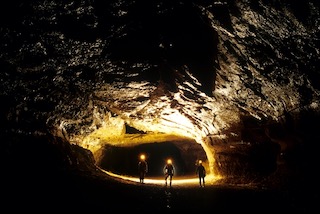It seems that not everyone is fed up with lockdowns. On March 14th a team of volunteers – eight men and seven women – were sealed into a deep cave here in the Ariège for 40 days. They are part of a scientific experiment called the Deep Time project. It is the first of its kind in the world and is currently underway in the Pyrenees, in the Grotte de Lombrives, the largest cave in Europe by volume.
The experiment is part of a wide-ranging study into human behaviour; to study how humans manage and live together in completely unknown situations, and how the brain deals with time when there is no physical indication of its passage.
The Franco-Swiss leader of the experiment, Christian Clot, is one of the participants, and was inspired to set up the project having seen the problems of isolation caused by the COVID-19 pandemic. Hence the goal of observing the effects of long-term isolation, without any concept of time. “Losing time is the greatest disorientation there is,” according to the project’s website “And it is this aspect that the mission Deep Time wants to understand better. Because to this day, we do not know how our cognitive system understands and manages this indefinite continuity.”
The volunteers, including a jeweller, an anaesthetist and a security guard, from all over France are taking part in the project on a voluntary basis, without any compensation. Arnaud Burel, a 29-year-old biologist, agreed to take part in the mission “to get a taste of this timeless life, impossible outside with our computers and mobile phones constantly reminding us of our appointments and obligations,” he says.
They will have no source of light, no phones, watches, or any other method of knowing even what day it is and will have to get used to the 12 degrees and 95% humidity of the cave, generate their own electricity by means of a pedal system, and draw the water they need from a depth of 45 metres. They will also be equipped with an assortment of sensors that will allow a dozen scientists to follow them from the surface. The cave has been divided into three separate living spaces; one for sleeping, one for living and one for carrying out studies on the topography of the place, the fauna and flora in particular.
“This experiment is a world first,” Professor Etienne Koechlin, a neuroscientist at the École Normale Supérieure in Paris, said: “Until now, all missions of this type focused on the study of the physiological rhythms of the body, but never on the impact of this type of temporal rupture on the cognitive and emotional functions of the human being.”
The findings of the project could be relevant to future space missions, submarine crews, mining teams and other settings where people are enclosed for long periods.
The ‘Deep Time’ experiment began at 20:00 local time on Sunday, March 14 and, if all goes to plan, the volunteers will come back out on April 22.
You can read more about the experiment on the Deep time website here
Find more information on the Grottes de Lombrives here
If you would like help finding a property in France, please get in touch: nadia@foothillsoffrance.com






You must be logged in to post a comment.